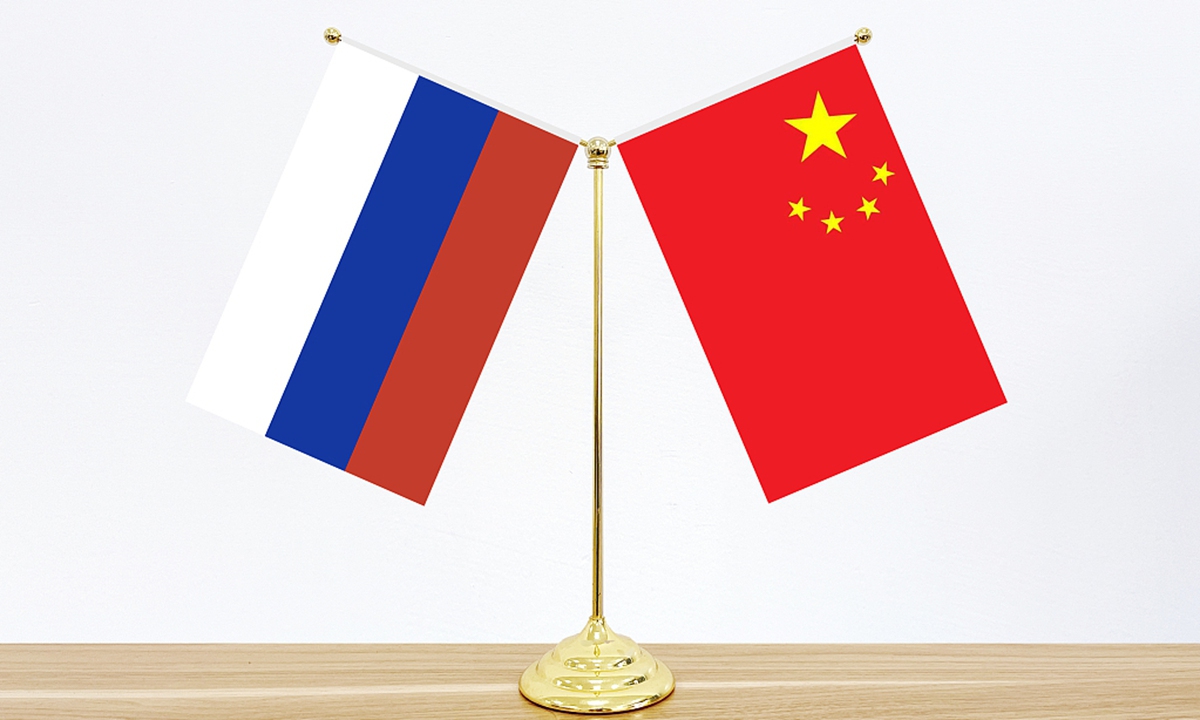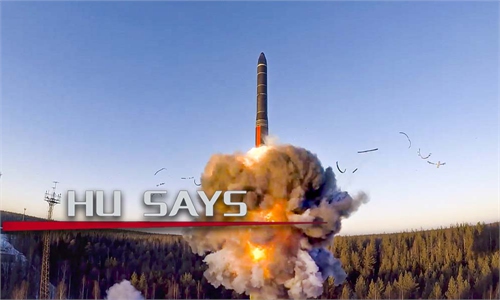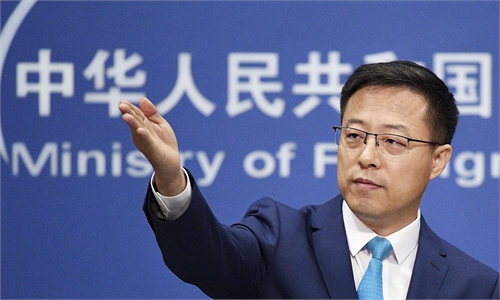Xi, Putin hold phone call, vow mutual support amid global turbulence
China-Russia strategic ties remain solid despite rising Western pressure: experts

China Russia Photo:VCG
Chinese President Xi Jinping on Wednesday afternoon held a phone conversation with his Russian counterpart Vladimir Putin, with analysts saying this is a signal to the world that the close China-Russia strategic partnership and high-level mutual trust between the two sides remain unchanged when the world is experiencing turbulence and uncertainty.
The NATO summit and the BRICS summit will be held later this month, and the communication between the top leaders of China and Russia is also sending a message to the world that the two major powers will continue to have mutual support on matters regarding their core interests and will keep pushing the multi-polarization of the international order, experts said.
There is no chance for the West to use the Russia-Ukraine crisis to instigate China-Russia ties and China's stance with fairness and justice has won the understanding of both Russia and Ukraine, observers noted.
During their conversation, Xi noted that since the beginning of this year, bilateral relations have maintained a sound development momentum in the face of global turbulence and transformations.
The economic and trade cooperation between the two countries has made steady progress, Xi said, adding that the Heihe-Blagoveshchensk cross-border highway bridge has opened to traffic, creating a new channel connecting the two countries.
The Chinese side stands ready to work with the Russian side to push for steady and long-term development of practical bilateral cooperation, Xi said.
The two heads of state also exchanged views on the Ukraine issue. Xi emphasized that China has always independently assessed the situation on the basis of the historical context and the merits of the issue, and actively promoted world peace and the stability of the global economic order.
All parties should push for a proper settlement of the Ukraine crisis in a responsible manner, Xi said, adding that China for this purpose will continue to play its due role.
Yang Jin, an expert at the Institute of Russian, Eastern European, and Central Asian Studies under the Chinese Academy of Social Sciences, told the Global Times on Wednesday that this shows that the strategic firmness of China to keep developing ties and promote cooperation with Russia in the fields of economy and trade, even if the West is pressuring China to join their sanctions against Russia.
On this matter, China is not alone, as most non-Western countries, as well as some EU and NATO members, don't share the view to indiscriminately sanction Russia on everything or cut off all cooperation and exchanges even if this comes with a high cost, and there is nothing wrong for the countries to develop ties with Russia based on the interests of their people, said analysts.
China is willing to work with Russia to continue supporting each other on their respective core interests concerning sovereignty and security, as well as on their major concerns, deepening their strategic coordination, and strengthening communication and coordination in such important international and regional organizations as the United Nations, the BRICS mechanism and the Shanghai Cooperation Organization (SCO), Xi said.
China is also willing to work with Russia to promote solidarity and cooperation among emerging market countries and developing nations, and push for the development of the international order and global governance toward a more just and reasonable direction, he added.
Cui Heng, an assistant research fellow from the Center for Russian Studies of East China Normal University, told the Global Times on Wednesday that since the beginning of the Russia-Ukraine crisis, the US has fully activated its Cold War asset, and the upcoming NATO summit will adopt a new Security Concept for the Alliance to target not only Russia but also China, and Japan and South Korea's leaders will attend the summit for the first time.
"It's clear that NATO is no longer a military organization in the regions around the north of the Atlantic, but will step into Asia and have global influence, and more importantly, it targets Russia and China as its rivals, even enemies," he said.
China and Russia have no choice but to jointly resist NATO's all-round suppression through close strategic coordination, and further maintain the balance of the global strategic situation, Cui said, noting that this is the key signal delivered by the conversation between Xi and Putin.
Yang stressed that the NATO summit is focusing on military and security, while the BRICS summit is focusing on development and the cooperation among the rising economies, so they are different and will not become some kind of Cold War situation like bloc-to-bloc confrontation. But it is important for China and Russia, as well as the rest of BRICS members to send a signal to the world that the international order should focus on development and to ease tensions via dialogue rather than letting a few Western countries dominate the international community to make confrontation dominate the international relations.
Another important opportunity for President Xi's phone call with President Putin is that today is President Xi's birthday and the two leaders have enjoyed a deep personal friendship for more than a decade. Mutual trust between the leaders of the two countries guarantees the long-term stability of China-Russia relations, Cui noted.
For his part, Putin said the Russian side sincerely congratulates China on its remarkable development achievements under the strong leadership of Xi.
Since the start of the year, the practical cooperation between Russia and China has been developing steadily, he said, adding that Russia supports the Global Security Initiative proposed by the Chinese side, and opposes any force to interfere with China's internal affairs using so-called issues regarding Xinjiang, Hong Kong and Taiwan, among others, as an excuse.
He noted that Russia is ready to strengthen multilateral coordination with China so as to make constructive efforts in boosting multi-polarization of the world, and establishing a more just and reasonable international order.
Russia's support toward the issues related to China's core interests, especially on those which face pressure and threats from the US, is as strong as always, said analysts.
The China-Russia comprehensive strategic partnership of coordination is "the backbone of a multipolar world and plays a vital role in defending NATO's global ambitions and US hegemony," Cui said.
The multilateral cooperation mechanisms with China and Russia's key participation, such as the BRICS and the SCO, are having a stronger voice in international and regional affairs, experts said. "A key is that China and Russia are able to provide precious public goods to many developing countries, which have no ideological strings attached compared with the ones provided by the West," Cui noted.
On Wednesday, the 12th Meeting of BRICS National Security Advisers and High Representatives on National Security was held virtually, chaired by Yang Jiechi, a member of the Political Bureau of the Central Committee of the CPC and director of the Office of the Foreign Affairs Commission of the CPC Central Committee in Beijing.
The topics are multilateralism and global governance, new threats and challenges to national security, and governance of new frontiers, Chinese Foreign Ministry spokesperson Wang Wenbin said at a regular news conference on Wednesday. National security advisers and high representatives on national security of South Africa, Brazil, Russia and India attended the event.
"As the BRICS chair, China looks forward to working with other BRICS members to further consolidate political mutual trust, deepen political and security cooperation, jointly safeguard our security and development interests, and make positive contributions to promoting world peace and stability," he said.




